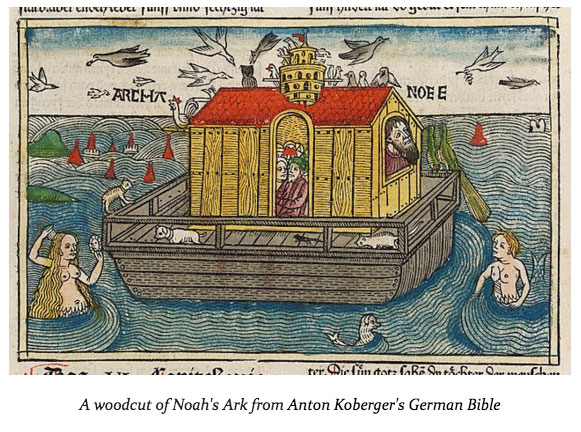Upon the Waters
The Friday Reflection by James M. Kushiner
September 11th, 2020

Without water, there is no life. The planet earth is truly a water world, with 71 percent of its surface covered by water, and filled with water-dependent creatures innumerable—some comprised of nearly 90 percent water, others, like homo sapiens, 60 percent water. Every living cell requires water, a fortuitous combination of two hydrogen and one oxygen atoms. Water is everywhere. Of the Creator of this water-world we confess:
"He covers his high walls with the waters; appointing the clouds for his staircase, ascending on the wings of the wind;
making his angels his spirits, his ministers a flame of fire.
The deep like a garment is his clothing,
the waters shall stand upon the mountains.
At your rebuke they shall flee, at the crash of thy thunder they shall tremble with fear.
The mountains rise, the valleys sink down to the place thou hast founded for them.
Thou didst set a boundary never to be passed, the waters shall never again cover the earth.
Sending springs into the valleys, he shall make the waters flows between the mountains.
They shall give water to every beast, the wild asses shall quench their thirst.
He waters the mountains from his upper chambers.
(Psalm 103, Septuagint, translated by Donald Sheehan)
The mountains rose, the valleys sank down—to provide the planet with just 29 percent of its surface as land sticking up through the 71 percent ocean surface for man to live on—some of that land it not easily habitable (Antarctica anyone?) We are all islanders; some islands are just larger than others. I am amused by Scottish islanders speaking of "going over to the mainland," by which they mean the northern part of the island of Great Britain which they call Scotland—not the "mainland" Continent of Europe.
We all live on a thin earthen skin of islands in the sea and grow our food upon an even thinner skin of soil. While much of the skin of the earth upon which we might stand may be rock, sand, or tundra, for our daily bread we must have a precious skin of soil. Soil is considered an ecosystem, and, no surprise, water plays a crucial part in its formation, maintenance, and replenishment. Water is the lifeblood of both the plant and the planet.
Yet of all the earth's water, 97 percent of it is in the salty ocean, which will not quench our thirst or water our cattle or crops (except seaweed).
Of the remaining 3 percent of the earth's water, two-thirds of it is frozen in glaciers and ice caps. Just 1 percent of the earth's water is liquid fresh water, including a tiny fraction of that which is actually water vapor in the atmosphere, which is needed to daily water the earth.
As much as we depend on our daily bread, we depend on our daily water, and the earth depends on the daily cycle of rain creating that fresh water that fills ours wells, springs, rivers, and lakes. The Lord is the one who "waters the mountains," providing slowly melting snow to keep the rivers flowing in the summer.
Fresh water itself, then, is a tiny island of all the earth's water, one upon which we depend, separated from the undrinkable salty ocean that covers most of the world. We either dwell near or import this fresh water, without which we die.
There are two streams in which we live. We live in this fragile yet abundant stream of fresh water in the world, but also in a second stream, the waters of baptism and the living streams of the Spirit, which are supposed to flow from our innermost being. We are in the world, alive, but not of it, for we live by the Spirit into whom we have been baptized.
Human life sits on a knife's edge, on a thin blue line of water, and when catastrophe strikes a village and disrupts life, oftentimes water is the first thing required and brought in by relief workers.
The spiritual life of Christians, the Church itself, the Body of Christ, rests in the waters of baptism, a dying with Christ. When we take up the daily cross and the yoke of Christ, we are relieved by a life-giving drink of the living water discovered by the Samaritan Woman at the deep Well of Jacob. It's there for us, every day.
Yours for Christ, Creed & Culture,

James M. Kushiner
Executive Director, The Fellowship of St. James
—James M. Kushiner is Executive Editor of Touchstone: A Journal of Mere Christianity, and Executive Director of The Fellowship of St. James.







